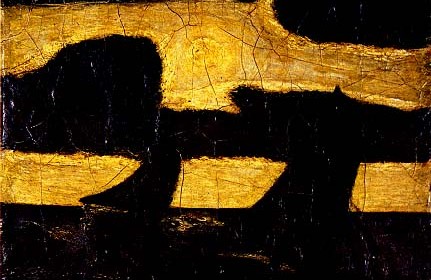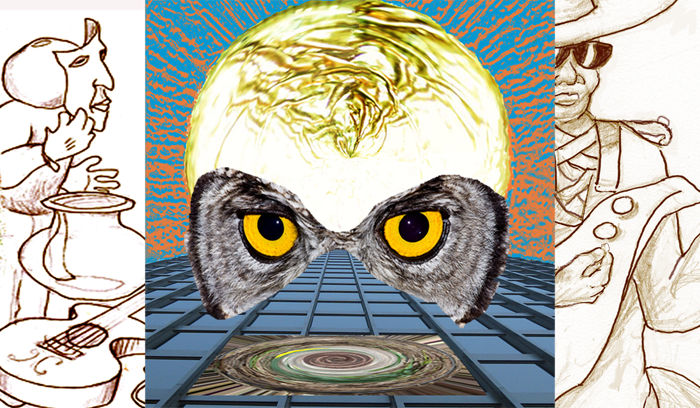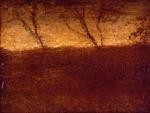Albert P. Ryder ~ A Romance

“Albert P. Ryder ~ A Romance” Fictionalized biography by Joe Henderson © 2015
More attuned to creating dream-like paintings than attending to his own well being, Albert P. Ryder could be the model for the time-worn cliché of the bohemian artist. His clothes were old and dirty, he couldn’t throw anything away, and he left money and uncashed checks lying around in the trash that cluttered his studio apartment in late nineteenth century New York City.
But a bright shiny soul inhabited that unwashed body, and was animated by a love of poetry and Shakespeare, mythology and the Bible, as well as his New England fishing village upbringing on which he drew heavily to create a style of painting that has one foot in romanticism, the other in what is now considered a forerunner of modernism.
Visitors who entered Ryder’s dark cave of neglect would cringe at the incredible mess he lived in, until they became aware of the paintings, propped up or perched here and there on heaps of junk, shining out in the gloom like precious gems glowing with their own light.
As amazing as the paintings are they have always had a precarious existence. Ryder worked and reworked some paintings for years, and some of his bad housekeeping habits extended to a lack of skills when it came to correct painting methods and use of media.
In Ryder’s mind, any and all materials were fair game for use. He often mixed pigment with such unconventional media as alcohol, grease, kerosene, candle wax, asphalt, linseed oil, and some that have yet to be identified. If he wasn’t satisfied with the thick melange of media and pigment, he might scrape the whole mess down to canvas and apply a glaze, or scumble over another part to produce the effect he wanted. Sometimes he poured varnish directly onto wet oils then painted on top of the varnish, too impatient to wait for either layer to dry. These feral methods made for mysteriously beautiful paintings that began to self destruct almost immediately because the mix of materials dried at different rates, or some (like asphalt) did not dry at all, causing whole sections of a painting to slide around, or develop cracks where the still wet underlayer continues to bubble out to this day. Other paintings have darkened so over the years it’s difficult to see much detail at all.
But when the effect is so glorious, his methods have proved to be worth it, however fragile or ephemeral the painting is. For seldom has anyone quite matched the mystical grandeur of his Moonlight Marine series, or The Lone Horseman, Temple of the Mind, Moonlit Cove, Macbeth and the Witches, and many others. Thankfully, contemporary photographs were taken of some of his work so we get to see how Ryder’s more unstable paintings appeared around the time of their creation.
When he wasn’t wrestling with his materials, he would often take long walks in the moonlight through the streets of Chelsea or Greenwich Village, or on occasion go out with a tight circle of artist friends.
# # #
One night he had supped in a tavern with friends and lingered with them for hours, drinking beer and enjoying their company, until one by one, they bid him goodnight until he found himself alone. His head dropping to his chest, he fell asleep and found himself in a dream that picked up where the visit with his friends had left off, except they were now rambling along one of Ryder’s favorite country lanes outside his boyhood home of New Bedford. The talk was jolly and it was a beautiful day in autumn, with a pale blue sky framed by green fields and patterned by the golds and reds and browns of the trees. As the sun dropped below the horizon, the animating light he so adored in nature began to radiate from the earth, a dark living light that shimmered with roiling, gradating colors that could not be found at noonday.
As the twilight deepened the companions passed a clearing where a massive full moon could be seen rising between two clumps of dark green trees, lighting their edges like ripped cloth of burnished gold. Ryder stopped, arrested by this sight; in his imagination it looked like it could be a scene from some of his favorite poems, Thomas Moore’s Lalla Rookh or Kublah Khan by Coleridge, and other stories set in exotic places like Persia and Arabia. What a painting it would make! As Ryder’s mind swam with golden turrets gleaming in the moonlight, his companions went on down the road without him into the deepening dusk, singing a merry song.
Torn between staying and following his friends, Ryder was about to do the latter when a man and woman entered the clearing from opposite sides as if on a stage. They stopped and faced one another about a dozen feet apart, stood still for a moment then ran together, colliding in a passionate embrace with Ryder watching wide eyed as they kissed and tore at each others clothing. Suddenly a woman’s voice rang out in the distance, calling a man’s name. The man jerked his head in the direction of the voice and pushed the woman away, holding her at arm’s length for a moment then released her and ran back the way he’d come, casting a look over his shoulder as he disappeared.
Left behind by her lover, the woman covered her face with her hands and wept.
Ryder felt himself trembling with rage. He didn’t like how that so-called man had abandoned his lover just because someone had called his name, the coward. He wanted to run up and take her in his arms and comfort her, but being a stranger knew he would only frighten her.
She reminded him of a young woman who lived in his building, who practiced her cello in the evenings and had played so sweetly one night that Ryder had completely lost his head and ran down to her room and proposed marriage to her on the spot. The cellist had turned him down of course, saying she was betrothed to a captain in the navy. Ryder, coming to his senses, had apologized profusely for the intrusion then stumbled back to his dreary room in shame. The incident had happened several months before, but the embarrassment he’d experienced was still fresh.
Ryder looked down at his clothes and rough appearance and frowned, shaking his head. What woman would want to be with the likes of you, anyway? he asked himself. A raggedy painter of fairy tales!
A loud sob came from the woman again, and Ryder clenched his fists; he must comfort her, and not be like the faithless lover who had bailed out when things got difficult! If only he were someone she already knew, someone more presentable, then maybe she wouldn’t be frightened of him—a man like the cellist’s navy captain perhaps? Or even the man she had just embraced? If he were to suddenly return right then and beg her forgiveness for running off, she might be so happy to see him come back again she would forgive him and fall into his arms, and then they could continue where they left off in that holy place of golden green trees, shining like domed Islamic turrets in the moonlight. Lalla Rookh again popped to mind.
The story was about a caliph who disguises himself as a poet and accompanies his betrothed on a long journey to the place where they were to be wed, telling stories to his unwitting bride to wile away the hours, then revealing himself in the end as her husband-to-be. Ryder warmed to this idea; perhaps he, too, could pose as the woman’s lover in disguise. The problem was, he wasn’t sure how he could pull off such a ruse out there in the woods, even if he wanted to; in order to look like the man who ran away, he would have to lose 50 pounds and shave his beard!
What are you trying to do? Ryder muttered to himself, shaking his head. Such a charade, even if it were possible, couldn’t last because sooner or later she would find out he was an imposter. And any love she might feel for him would have been meant for someone else.
He finally decided to just try approaching her as a concerned bystander. But by the time he opened his mouth to speak, she was gone.
All at once the moon-soaked woodland scene that had so enthralled him before now seemed empty and cold without her in it. The emptiness was too hard to bear. Treating the scene before him as a prepared canvas with the background already laid in, he reached for his brushes and paints to begin working, but try as he may he couldn’t seem to find them.
Desperate to get the images that were pouring into his head onto canvas, Ryder reached up with his index finger and scooped up the bright creamy area in the middle of the moon and daubed in the woman’s face and body, then sampled the darker colors from the trees and leaves with his finger nail and laid in her features, and the entire scene became his palette.
As he worked, he marveled at the feel of his finger-brush on the canvas of air and how the figures seemed to appear effortlessly. What a feeling it was! He tenderly refined the shape and contour of the woman’s body, trying to paint her how he remembered her, but at some point he realized he was turning the woman into his cello player. And she was naked.
He blushed down to his toes. His paintings had featured nudes before, like his Dancing Dryads who danced without a stitch of clothing, but that had seemed perfectly in line with classical literature and a long tradition of historical art. This, however, seemed like it was verging on voyeurism, wish fulfillment. Ryder shook his head. Naked women could be had for a price down on 4th Street; he wanted a woman he could share his life with.
Sampling the golden light on the leaves, he covered the woman in a long, sumptuous robe.
He added some shadings on her face, then stepped back several feet, and tilting his head to one side, he looked long at the painting and smiled. Not bad—not too bad at all.
He decided to leave her for now and try blocking in the figure of the unfaithful lover in the act of returning. Since he’d turned the woman into his cello player, why not place himself in the picture as well? He started to do this, but it made him feel self-conscious. He had an idea; instead of making the figure into his own image, why not depict himself as the caliph disguised as the poet from Lalla Rookh in the act of revealing himself to his bride to be? It would be tricky to do, but he liked the challenge.
With his tongue sticking out the corner of his mouth Ryder set to work creating the figure who was supposed to be him in several layers of disguise. He painted and painted, and painted some more, and at some point he glanced back at the female figure and gasped. She seemed to be staring back at him like a living person.
“You’re lonely—aren’t you?” he said, speaking for her. He imagined that she looked at him with pity.
“Yes, I am very lonely,” he answered, addressing her by the cellist’s name.
She shook her head. “You have mistaken me for someone else. My name is Nourmahal, and I am betrothed to a caliph.”
“No, no,” said Ryder, trying to take her in his arms. “I am your caliph, I am the one to whom you are betrothed.”
“No!” she cried, and he took a step back as if Nourmahal had pushed him away in distress. “You are a poet who spins beautiful tales—I admit I am attracted to you, but I have sworn to marry my caliph.”
Struck by the peculiar irony of this, Ryder stared at her open-mouthed for a moment. He tried to tear off his poet’s disguise to show her who he really was, but his hands were thwarted by the flat surface of the canvas. Out of desperation he gripped hold of the scene and tore it from its moorings in the sky, and the light of the moon on the lovers in the woods blinked out like someone had hit an off switch.
This shocked him so badly the painting slipped from his hands and dropped to the floor.
Falling to his hands and knees, Ryder stared at the canvas. Without its living light the scene was flat and cold as a corpse. What happened? It had been so good just moments before! Tears sprung to his eyes.
He tried desperately to sample the moon again, but he couldn’t seem to scoop its light onto his finger the way he’d done before, or from anywhere else on the painting. It was as if the paint had dried! How could this be? Hadn’t he just been painting with it?
Tears streamed down his face and onto the canvas. He was about to give up in despair when one large tear dropped directly onto the woman’s face, and—something happened. The tear created a lensing effect that gave her face an interesting sort of grainy opalescence, creating colors that could only be found in moonlight or in the oblique rays of sundown.
He needed more tears! Ryder got very excited; oils didn’t ordinarily mix with watery tears, but maybe he’d been living and sleeping and wallowing in his media for so long, his tears had varnish in them from long exposure!
He dredged up every sadness he could think of, the long lonely years of working in isolation to bring his visions to life, trying to create something beautiful, foregoing personal happiness, wife, children and family, giving up everything for his art until the tears poured out of him and onto the canvas in a wave that roiled and rippled and glimmered in its own light like a briny moonlit ocean that he and his lover could sail away on.
Mopping his face with his sleeve, he grabbed up the canvas, and being careful not to let the medium of tears stay on too long, he tipped it from side to side several times for even coverage, then poured it off and set it down to dry.
After time passed he saw that the effect had taken, and it looked glorious!
Ryder sat back on his haunches, exhausted, warming himself in the glow of satisfaction of having successfully portrayed what he’d set out to create. Then his eyes began to stray; he looked around in confusion at his paint-smeared hands and broken furniture, and in the bleak light of morning he realized he was at home, in the cluttered mess of his apartment. He had no memory of how he he’d gotten there from the tavern—or when—but somehow he did, and he’d made something beautiful: a painting of two people enshrouded in the mystery of love. And there it was, in all its shimmering, mystical glory. The light he’d captured in it was especially fine, he noted happily; he must use that method again! Then suddenly feeling very tired, Ryder got up and started to stagger off to his poor excuse of a bed, when he stopped and turned around, fixing his eyes on the figure of the caliph in the painting.
“She told me she was attracted to me,” he whispered, grinning from ear to ear.
# # #
The location of Ryder’s Lallah Rookh is unknown.
Sources: Albert Pinkham Ryder, Painter of Dreams by William Innes Homer & Lloyd Goodrich; Wikipedia.





